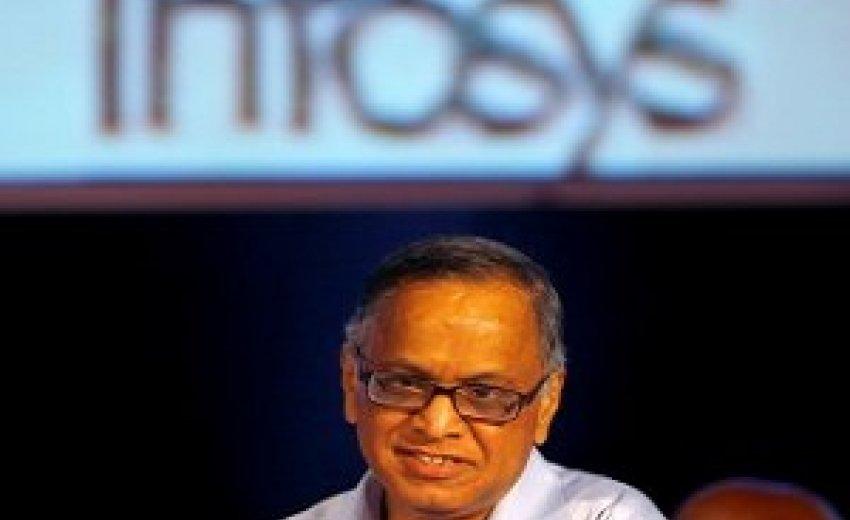 |
| Namas Bhojani for The New York Times Employees in 2008 at Infosys in Bangalore, India. The company's visa practices are under scrutiny. |
Accusations that the company, Infosys Technologies, repeatedly violated the terms of business visitor visas were first raised in a lawsuit filed in February in Alabama by Jack Palmer, an Infosys project manager. Aside from Mr. Palmer, at least two other Infosys managers in the United States have submitted internal whistle-blower reports pointing to Indians on business visitor visas who were performing longer-term work not authorized under those visas, according to internal documents and current Infosys managers.
In May, Infosys acknowledged that it had received a subpoena from a federal grand jury in Texas seeking information about the company’s use of the visitor documents, known as B-1 visas, which are easier to obtain. This month, N. R. Narayana Murthy, an Infosys founder, expressed his concern about that investigation at a board meeting in Bangalore, India, in his final address before he retired as company chairman.
“As I leave the board, I feel sad” about the subpoena, he said. “The issue will be decided on its merits in due course,” said Mr. Murthy, who is something of a legend in global business for building the company over three decades from a $250 investment into an outsourcing powerhouse with $6 billion in revenues.
In papers filed in Mr. Palmer’s lawsuit, Infosys denied all his accusations and asked a federal judge to remove the dispute from court and send it to arbitration. In a statement, Infosys said it was committed to “absolute compliance” with American visa requirements and had undertaken an internal review of its practices.
“Infosys is a large and rapidly growing company,” the statement said. “We have made changes over time to certain of our policies relating to the business visa program and we may continue to make improvements in those policies and controls.”
The Infosys inquiry coincides with a broader attack in Congress on longer-term visas, known as H-1B, that Infosys and other Indian companies rely on to bring Indian technology workers to the United States. With unemployment for Americans stubbornly high, lawmakers have become increasingly reluctant to defend H-1B visas, which give temporary residence to highly skilled foreigners. In recent years, the top companies receiving those visas were not American names, but Infosys and another big Indian outsourcing company, Wipro.
Last week, Representative Zoe Lofgren of California, the senior Democrat on the immigration subcommittee of the House Judiciary Committee, introduced a bill that would increase the wages employers would have to pay H-1B workers, in an effort to ensure they do not undercut Americans. The measure is specifically aimed at Indian outsourcing companies. Last year, Congress added an extra $2,000 to the fee for H-1B visas, in another move aimed at the Indian companies.
 |
| Aijaz Rahi/Associated Press N. R. Narayana Murthy, a founder and recently retired chairman of Infosys. |
In general, B-1 visas are granted to business visitors coming to the United States for short stays to attend meetings, conferences or training sessions, or to install specialized equipment. Visitors may not be employed for contract work like H-1B workers, nor can they be paid salaries in this country. There is no annual limit on business visitor visas, whereas H-1B visas are restricted to 85,000 a year.
Mr. Palmer said his supervisors asked him to write letters inviting workers to come from India for sales and training meetings, letters he believed were false. “I refused to write the letters,” he said.
After word got out of his refusal, Mr. Palmer said, he was chastised by his managers and began to receive threats by e-mail and telephone. In October, Infosys has confirmed, Mr. Palmer filed a whistle-blower report about B-1 visa holders from India assigned to projects he or others managed. His report said the B-1 visa holders were doing the same tasks as workers on H-1B visas, including writing and testing software code. Mr. Palmer said he personally knew of at least 60 Indian workers doing contract work on B-1 visas.
Mr. Palmer still works at Infosys. He feels isolated and besieged within the company, according to Kenneth Mendelsohn, his lawyer in Montgomery, who has instructed him not to speak publicly about his experience.
“I’m protecting him as best I can so Infosys doesn’t fire him,” Mr. Mendelsohn said. But Mr. Mendelsohn provided documents and e-mails that he said Mr. Palmer has shared with investigators from the State Department Bureau of Diplomatic Security, the Department of Homeland Security and the Justice Department.
In one e-mail, another Infosys manager confirmed to Mr. Palmer that three Indians on B-1 visas were “working on client sites” on a contract with Baker Hughes, an oil services company in Houston.
In an e-mail exchange with Jeffrey Friedel, a top lawyer for Infosys, Mr. Palmer described the work assigned to one B-1 visa holder on a project for Heidrick & Struggles, an executive search company in Chicago. “His project task consists of reviewing designs and then to physically create and write test scripts,” Mr. Palmer wrote. “This process is repeated over many weeks.”
Referring to the same employee, another manager wrote that he was “working on a B-1 visa” and cautioned his colleagues not to include the man’s name in any contracts. “We can’t put name on B-1 people for contract,” the manager wrote.
In an e-mail in December, Mr. Friedel assured Mr. Palmer that the issues he had raised “have made it clear to management that certain changes need to be made to our systems.” Mr. Friedel enumerated seven steps the company would take to prevent misuse of visitor visas.
But only this month, another Infosys manager became alarmed after discovering by chance that B-1 workers were among the team members on a project under the manager’s supervision. “There was no significant difference between the B-1 and the H-1B employees in the type of work they did,” the manager, who was granted anonymity out of fears of retaliation by the company, said in an interview.
At least one of Infosys’ major clients, Wal-Mart, has been contacted by investigators about its contracts with Infosys. Greg Rossiter, a Wal-Mart spokesman, declined to comment. There has been no suggestion of wrongdoing by any Infosys client mentioned in the visa investigations.
A State Department official in India said Infosys and other Indian companies had made use in recent years of an exception in the complex visa guidelines that allows them to send workers to the United States on B-1 visas for up to six months for certain short-term projects that might otherwise have required an H-1B visa. Since last year, the State Department has clamped down on the use of that exception and is considering whether to eliminate it, the official and several outsourcing executives in India said.
Mr. Palmer, who is known as Jay, filed his lawsuit claiming that Infosys had failed to protect him from threats from within the company he received after submitting his whistle-blower report, and had unfairly withheld more than $100,000 in bonuses he was owed. Described by his lawyer, Mr. Mendelsohn, as “on an emotional roller coaster,” Mr. Palmer has reported receiving a new death threat against himself and his family as recently as April.
While denying Mr. Palmer’s claims, Infosys has noted that Indian employees with business visitor visas are a small part — less than 2 percent — of its teams in the United States. The company reports a total of 15,500 employees in this country, including 10,100 on H-1B visas. North American clients account for 65 percent of the company’s revenue.
At least one top Indian executive overseeing United States immigration procedures has resigned from the company, Infosys said.
But Senator Charles E. Grassley of Iowa, the top Republican on the Senate Judiciary Committee who closely monitors United States visa programs, said he remained skeptical of Infosys’s intentions.
“It appears the B-1 visa program has become a subterfuge for companies wanting to avoid the cap and wage requirements of the H-1B visa,” Mr. Grassley said.

